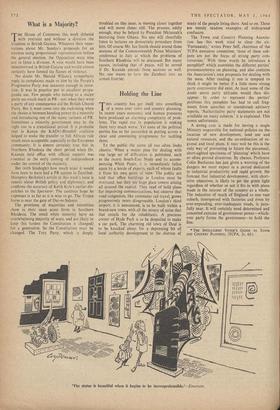What is a Majority?
THE House of Commons this week debated with restraint and without a division the situation in British Guiana. Whatever their reser- vations about Mr. Sandys's proposals for an election using proportional representation before the general election, the Opposition were wise not to force a division. A vote would have been misconstrued in British Guiana and'would almost certainly have fanned the flames of violence.
No doubt Mr. Harold Wilson's sympathetic reply to complaints made to him by the People's Progressive Party was innocent enough in inten- tion. It was in practice put to excellent propa- ganda use. Few people who belong to a major party see much merit in PR—nor when they were a party of any consequence did the British Liberal Party. But it must come into the reckoning when the choice is between handing power to a minority and introducing one of the many variants of PR. Sometimes a minority government may be the right one in a transitional period. It is probable that in Kenya the KADU-Blundell coalition helped to make the transfer to full African rule much more acceptable, especially to the European community. It is almost certainly true that in Northern Rhodesia the short period when Dr. Kaunda held office with official support was essential to the early coming of independence under the control of the majority.
But (with hindsight) how much wiser it would have been to have had a PR system in Zanzibar. Humphry Berkeley's article in this week's issue is caustic about British policy and diplomacy, and confirms the accuracy of Keith Kyle's earlier dis- patches to the Spectator. The cautious hope he expresses is as far as it is wise to go. The Trojan horse is near the gate of Dar-es-Salaam.
The problems of majorities and minorities show in their most acute form in Southern Rhodesia. The small white minority have an overwhelming majority of seats, and are likely to keep this (unless the Constitution is changed) for a generation. So the Constitution must be changed. The Tory Party, which is deeply
troubled on this issue, is moving closer together and will move closer still. The process, oddly enough, may be helped by President Nknimah's hectoring from Ghana. No one will cheerfully listen to lectures on democratic procedure from him. Of course Mr. Ian Smith should attend those sessions of the Commonwealth Prime Ministers' conference in July at which the problems of Southern Rhodesia will be discussed. But many causes, including that of peace, will be served if Dr. Kaunda attends those sessions as well. No one wants to turn the Zambezi into an armed frontier.














































 Previous page
Previous page